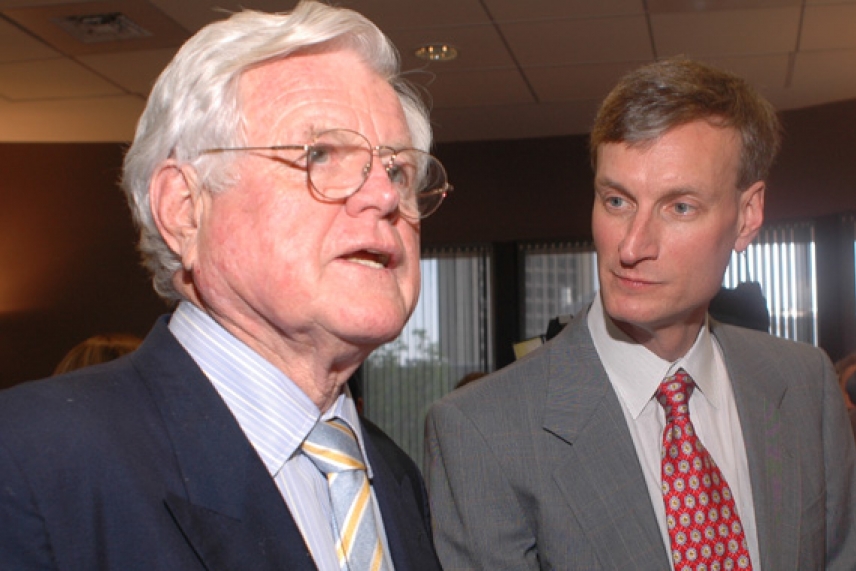Kennedy brings stem cell quest to Whitehead

Senator Edward Kennedy and Whitehead Interim Director David Page after the stem cell roundtable.
CAMBRIDGE, Mass. (June 15, 2005) — The United States should follow the lead of Massachusetts in legalizing responsible human embryonic stem cell research, Senator Edward Kennedy declared on June 2 at Whitehead.
Earlier that week, Kennedy noted, the state legislature overrode Governor Mitt Romney’s veto of a bill allowing a full range of embryonic stem cell research, including somatic cell nuclear transfer. “That’s where the people of Massachusetts are, and I think that’s where the people of this country are,” he said. “This is not a partisan issue.”
The U.S. House of Representatives has passed legislation that would free up federal funding restrictions on stem cell research. “This issue should be front and center in the U.S. Senate,” Kennedy said, adding that he hoped Senate debate would begin the following week.
At Whitehead, Kennedy chaired a roundtable on the promise of human embryonic stem cell research and the current hurdles in carrying it out. The roundtable brought together leading state politicians, prominent scientists, patients suffering from diabetes and Parkinson’s disease, and representatives from the biotech and general business communities.
“It’s important to realize the tremendous promise of stem cell research,” noted Whitehead Interim Director David Page, who hosted the event. “We are at the very beginning of what may be half a century of stem cell biology. But federal policy has taken the academic scientists of Massachusetts out of the game.”
The few researchers who have managed to pursue human embryonic stem cell research are continually held back by federal policies, emphasized Douglas Melton, co-scientific director of the Harvard Stem Cell Institute. "We're being hamstrung by rather arbitrary restrictions," he said. "It's extremely frustrating to be operating under conditions that do everything to shackle and hobble our research."
Stem cell biology will be the foundation for the regeneration medicine of the future, said George Daley, associate professor at Harvard Medical School and former Whitehead Fellow. While many conditions can be treated with small-molecule drugs, “when there’s tissue failure or organ failure, we need to deliver cells,” he said. Additionally, he expects that work on stem cells will produce enormously valuable new tools for biological research.
Daley, who also works as a physician at Children’s Hospital in Boston, says his lab enjoys “remarkably generous funding” from the National Institutes of Health to study mice with sickle cell anemia, but zero funding to follow up with human research.
As a result of the federal clampdown, “we are two years behind the Koreans,” he declared.
“What most impresses me is how little we know about stem cells, and how limited our ability is to anticipate the opportunities,” Page summed up. “We don’t know what clinical applications will come from this work. We’ve got to do the basic research.”
Topics
Contact
Communications and Public Affairs
Phone: 617-452-4630
Email: newsroom@wi.mit.edu